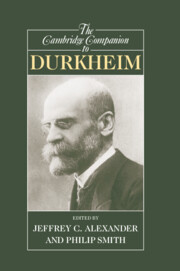1 - Introduction: the new Durkheim
Published online by Cambridge University Press: 28 April 2008
Summary
What does Durkheim mean for social science and social theory today?
This is a deceptively simple question. One way to attempt an answer is to put a deconstructive twist on the standard sociological literature about the production of culture and knowledge. It is commonplace within that field to suggest that authors produce texts to send messages to others. As participants in intellectual markets, writers strive to meet collegial expectations and hope to gain recognition in exchange (Collins this volume; Hagstrom 1965; Lamont 1987). Yet when an author's work has staying power beyond its immediate context, this being the very quality that distinguishes a truly great contribution, something much more intriguing happens. Readings proliferate that are unintended and unpredictable, with determinations that go far beyond those that could have been consciously anticipated by the maker of the original text. Time reverses the direction of influence. New contexts of interpretation come to rewrite texts as authors and theories are re-narrated for present relevance. Next, these critical interventions are themselves reworked and rethought. Eventually a layered field of immense dialogic activity is formed as words, ideas, their underlying structures of feeling and analytic choices accumulate and attach to the classical bedrock. It is precisely this sequential accretion of complexity and controversy that marks out the proper and full domain for inquiry into a great scholar. Because foundational texts and subsequent commentaries alike should be understood as social facts as well as a hermeneutic practice, we must give due attention to both scholarly intents and intellectual contexts. In thinking through questions about Durkheim and his legacy, we come to engage with others. These relate less to the cultural and intellectual preoccupations of other ages and more to those of our own.
- Type
- Chapter
- Information
- The Cambridge Companion to Durkheim , pp. 1 - 38Publisher: Cambridge University PressPrint publication year: 2005
- 24
- Cited by



